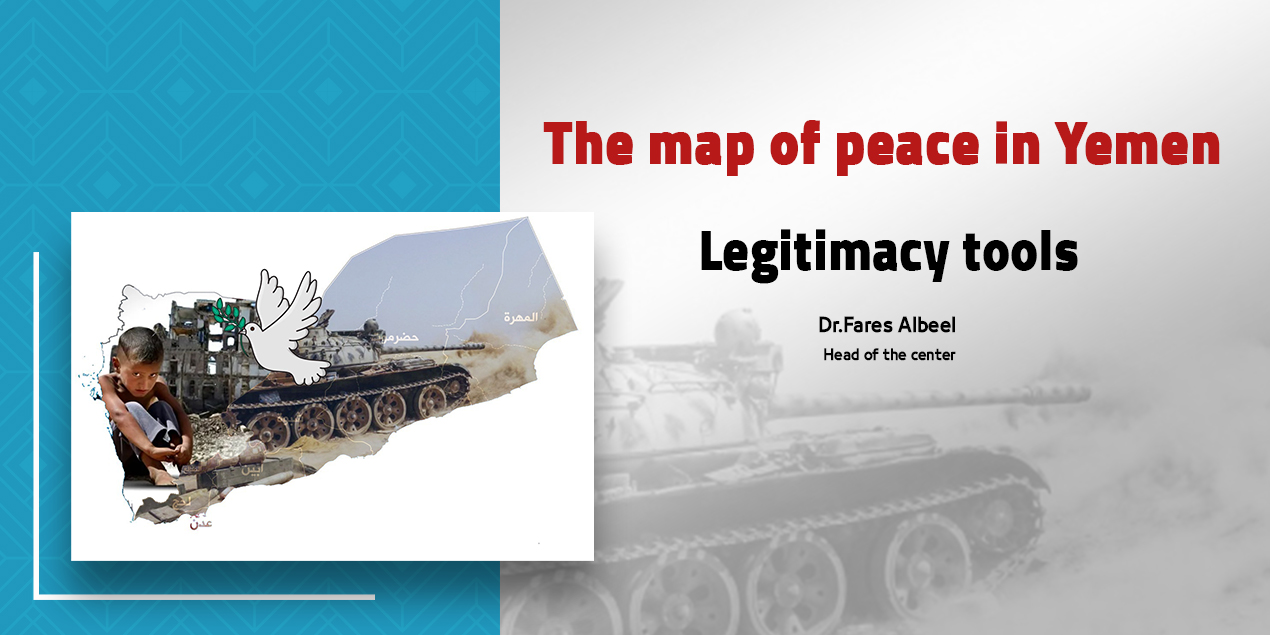Dr.Fares Albeel
Head of the center
The continuous movements in recent times are moving towards the near announcement of a road map for peace in Yemen, which includes various stages, building on a previous Saudi initiative, and perhaps what the stages include; especially the first stage is mainly confidence-building factors aimed at alleviating the suffering of people, and proving good intentions to move to the negotiation stage, and they have been discussed more than once through a truce or agreements, but they did not find a way to implement.
Since its formation in April 2022 the Leadership Council has announced that it will go to restore the state by peace or war, and the peace option seemed to be the closest task of the council،
Since then, there have been many changes and discussions internally and externally that have led to this stage of understandings and approaches.
Now the legitimacy seems to be represented by the Presidential Leadership Council in the most difficult situation, as it has to deal with international efforts and the wishes of many parties to end the war in Yemen and declare peace, while making many concessions, and then it is feared that once the wheel is put on the way to peace, there is no sense for the risks that accompany or follow it or what things will turn out to be, especially the experiences of agreements with the Houthis are bitter and do not inspire optimism, and the Houthi ideology and its goal is contrary to the partnership, the national project, the consistency of the state, the rule of law and the rule of law and the principle of democracy.
Therefore, the risk of moving towards a brief peace declaration, which may not be comprehensive and achieve the restoration of the state, seems fraught with a lot of ambiguity, as there is no clear vision of what will happen after peace, and how the future of the state and its formula will be, as if it is up to the factors of strength and gains of the Yemeni parties.
In this direction, several scenarios seem to us
First of all :
If things go in the direction of the literal and complete implementation of the map-although it is difficult-the legitimacy must develop strategic plans for this transition, about how the institutional state will be revived, and how it will secure its comprehensive return with its full sovereign concept, influence, presence and prestige, in light of the Houthi tactic and tendencies, and its unwillingness to enter into a national institutional framework.
The second scenario:
In the event that the Houthis partially reneges on the agreement; obstructing a number of obligations and points and not implementing them, how will the legitimacy deal with the matter and those flaws, will it jump on the pits or fill them up, what can only be done, what can be bypassed, and what are the effects of this on the agreement altogether Is he satisfied with what is available And overreacting under international pressure Or is it better to just go all in peace or leave it, what alternatives does Legitimacy prepare for each case of this,and what pressure sheets does Legitimacy have
The third scenario:
Complete reversal of this political path and its inertia, and return to the point of no return, and then there is no option to restore the state through it, so what are the solutions of legitimacy then In light of its constitutional responsibility to establish security in all the territory of the homeland, achieve a decent life for citizens, and remove all risks that detract from the land, the supply or the existence of the state, after exhausting its political and diplomatic options, and after the patience of Yemenis reached an unbearable extent, Yemen seemed on the verge of collapse.
However, Yemenis place their hopes on legitimacy not to waste their national gains, and not to go too far in concessions that may lose the features of the state, its institutional system and its democratic approach, and they also want legitimacy not to involve them in incomplete agreements that provoke or establish foci of future conflicts.
What Yemenis want is for their country to return fully, with its sovereignty, symbolism, national framework, various institutions, its way of serving people and its position in the region.
This may seem difficult, but Yemenis under the pressure of suffering and the collapse of the state are now demanding nothing more than survival, but over time they will be aware of the Impasse and shortcomings, and will memorize positions well and it will have an impact on their future.
What can legitimacy do now:
It is imperative for legitimacy to do this only when it is armed with the capabilities it can afford to achieve peace, and push it to achieve the desired end, the return of the state and extinguish all the hotbeds of conflict and ensure the sustainability of stability and redevelopment after years of massive destruction at the political, economic and social levels, awareness, identity and commitment of the state.. And here the legitimacy should go to all that is fortified by the following:
* Unify its dysfunctional ranks at least at the level of objective and discourse, arrange its political and economic house, its diplomatic position and its available alternatives in preparation for the next stage and its many requirements, and make sure that it goes to all of this fortified by political consensus.
* Putting human suffering as a priority for legitimacy, but provided that these concessions do not lead to opening a new field for the suffering of AJD, and a space for the Houthi group to exert pressure from other sides.
*It is better not to give up on national constants As for the political formulas of the nature of the Future Form of the state, it is subject to the interests of the people, according to the changes of the situation and politics, and legitimacy must measure it according to the prevailing pulse of the people, and not according to the balances of the political game or the wishes of politicians.perhaps the most confusing thing about comprehensive solutions in Yemen throughout the past periods was that the solutions were formulated based on the balances and satisfaction of the political parties, different powers and spheres of influence , not on the interest of the general people and the perceptions of the comprehensive state, as the people are always harmed, but solutions are developed for the benefit of politicians.
*Legality should keep in mind that this is the most dangerous stage in the history of modern Yemen, and therefore it must seek to establish this stage for the stability and development of Yemen and the renaissance of its crushed people, compensate them for the years of war, and consider a strategy for the future of Yemen, and how this peace is beneficial to the general people in accordance with these fundamentals.
* Legitimacy should not overload reference documents and legal and constitutional paths in its steps, and remain an important reference in its hands, and a guide to rely on in case of disagreement and stumbling, so that the state does not lose its legal framework and symbolism, and turn into the formality of harmonics.
* It is imperative that legitimacy, in its meetings with allies and mediators, proceed with firm and in-depth visions and aspirations supported by popular opinion for these efforts, and that legitimacy make sure that all its steps are well thought out and its positions as well, and to act with a clear antagonism, from a position of firm national interest with all initiatives and talks.
* Develop alternative scenarios in case of partial or total failure, and requested strong guarantees, And suggest references that can be referred to, with the presence of guarantors and parties capable of resolving the conflict in case of obstacles, and return to the right track firmly..
* Pressure for there to be clear guarantees and obligations for each stage, and to move from one stage to another according to the success and full implementation of the previous one, according to clear and strict plans and time periods and phases, leniency with any defect will lead to the abandonment of all agreements later.
* Expanding the circle of consultation and taking legal, political and community opinion before taking big steps, reviewing each step first.
*Considering that the next stage is a partnership stage with its various overlaps and complexities, and Yemen has a well-known political experience in government partnerships, power sharing and its differences, which often led to conflicts or the outbreak of war, therefore, there must be strict and clear rules supported by the Constitution and agreements So that Yemen's next dilemma after the war does not become the disputes of partners in governments.
* Ensure that no party goes by military or political force, or by internal or external factors, so that none of this is an obstacle to the coming stability and the consolidation of the state.
* Legitimacy should develop and oblige mediators with clear answers to how to disarm and neutralize all parties except the national state army, and remove the geographical, financial, functional and influential influence that can hinder the ultimate goal of peace and a strong state that serves the general people, and not be polarized by the hand of one party or force.
* There must be specific answers about the unity of the army, the monopoly of power and decision, and the end of military formations that harm the decision of the state and its sovereignty.
* What are the guarantees of the political scene and the return of elections and democracy, and how will all forces engage in an honest and fair competitive process within a national framework and a purely Yemeni reference.
* It seems that there is no solution in Yemen that guarantees the presence of the state and the service of its citizens with Justice and equality, except by reaching an advanced civil state governed by the Constitution and the law, and prevents the domination of ideology, unilateral and authoritarian ideas and totalitarian groups on governance.
* The public opinion must be open and provide answers and explanations, take appropriate transparency of what is happening, and provide appropriate explanations for situations and events.
* Public opinion must be informed and provided with responses and explanations, and appropriate transparency of what is happening, and appropriate explanations of situations and events must be provided.
*Develop appropriate perceptions of the upcoming forms of power, including decentralization, distribution of wealth and power, and propose solutions that achieve the aspirations of the people in accordance with their interests, needs and desires to ensure coexistence, equality and stability, including resolving the southern issue and other grievances that accompanied the political arena and the formality of the state previously, in accordance with the interest and desires of the people and the higher interests of national geography and the Yemeni state and its sovereignty, not the interests of the parties and influence.



















